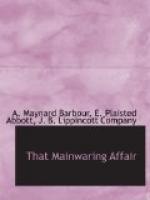Hugh Mainwaring, the sole heir to the family estate, soon after the death of his father, some twenty-five years previous to this time, became weary of the monotony of his English homelife, and, resolved upon making his permanent home in one of the large eastern cities of the United States and embarking upon the uncertain and treacherous seas of speculation in the western world, had sold the estate which for a number of generations had been in the possession of the Mainwarings, and had come to America. In addition to his heavy capital, he had invested a large amount of keen business tact and ability; his venture had met with almost phenomenal success and he had acquired immense wealth besides his inherited fortune.
His more conservative cousin, Ralph Mainwaring, while never quite forgiving him for having disposed of the estate, had, nevertheless, with the shrewdness and foresight for which his family were noted, given to his only son the name of Hugh Mainwaring, confident that his American-English cousin would never marry, and hoping thereby to win back the old Mainwaring estate into his own line of the family. His bit of strategy had succeeded; and now, after more than twenty years, his foresight and worldly wisdom were about to be rewarded, for the occasion of this reunion between the long-separated cousins was the celebration of the rapidly approaching fiftieth birthday of Hugh Mainwaring, at which time Hugh Mainwaring, Jr., would attain his majority, and in recognition of that happy event the New York millionaire broker had announced his intention of making his will in favor of his namesake, and on that day formally declaring him his lawful heir.
This had been the object of the conference in the private office of Hugh Mainwaring, and now that it was over and all necessary arrangements had been made, that gentleman turned from his desk with a sigh of relief.
“I am heartily glad that this business is over,” he said, addressing his guests; “it has been on my mind for some time, and I have consulted with Mr. Whitney about it,” with a slight nod towards the fourth gentleman, who was his attorney and legal adviser. “We have both felt that it should have been attended to before this; and yet, as I considered this would be the most fitting time to make a final adjustment of affairs, I have on that account delayed longer than I otherwise would have done. Now everything is arranged in a manner satisfactory, I trust, to all parties immediately concerned, and nothing remains but to draw up and execute the papers, which will be done to-morrow.”
“You are not then troubled with any unpleasant superstitions regarding the making of a will?” commented Mr. Thornton.
“No,” replied the other, slowly. “I am not of the opinion that it will hasten my exit from this world; but even if it did, I would have the satisfaction of knowing that my own wishes would be carried out in the settlement of my estate, and that no one would derive any benefit from my demise excepting those whom I consider legally entitled thereto.”




